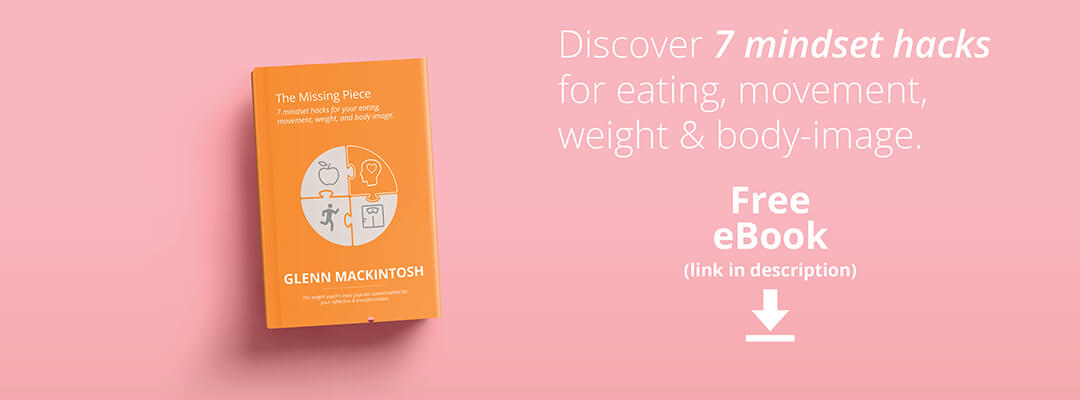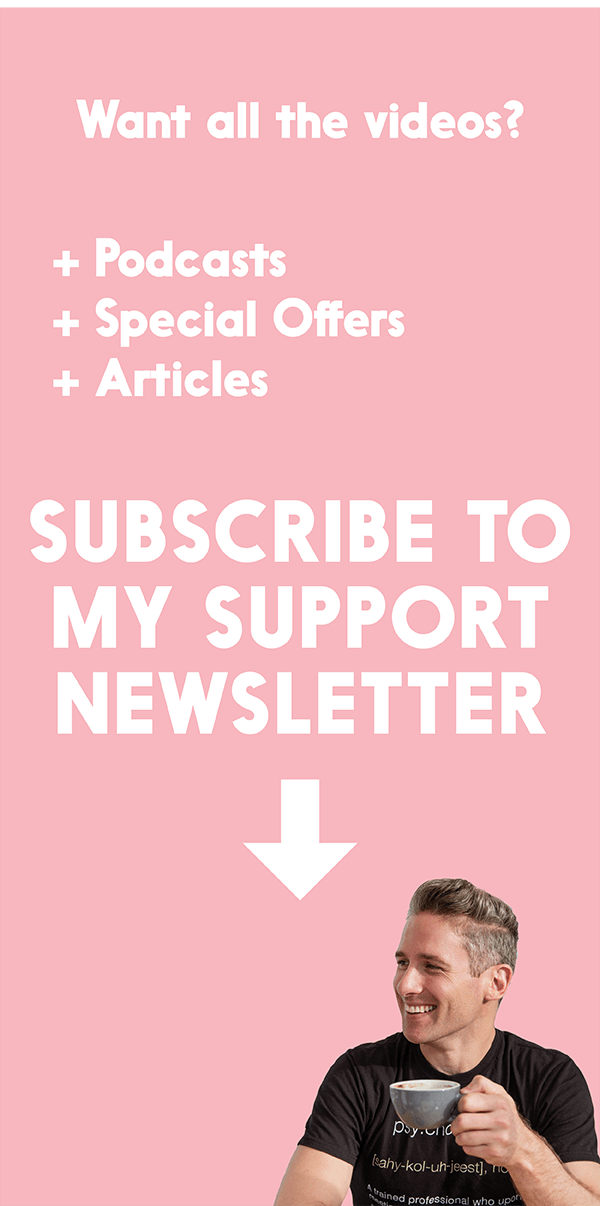
Body worries don’t exist in a vacuum – we learn them in an environment that stigmatizes fatness and idealises thinness and often become both victims and propagators of harmful weight bias. Leading up to our Love Your Body Healthy Online Program I answer questions about how your body image relates to other people and give you three important things to understand before you can really accept your body.
Watch Video
I created this video for people just like you.
If you found it valuable, please help me share it with them!
Find out more about Love Your Body Healthy
SHOW NOTES
- Viewer question “I think I’m fat, do others think that too?” [2:00]
- The mental mistake of mind-reading. [2:10]
- What is body-image? [3:44]
- Viewer question on being “too fat” to find love. [4:03]
- Avoidance rituals (and their long-term harm). [4:46]
- Embracing intimacy and accepting love. [5:29]
- On our current environment is not “fat-friendly”. [5:49]
- Viewer question on negative comments about their size from their partner. [6:28]
- On weight bias and working on your relationship. [6:47]
TRANSCRIPT
Hi everyone. It’s Glenn Mackintosh, The Weight Psych, and today we’re talking about body image and relationships. Welcome to Thursday Therapy, everyone. I hope you’re well. I’m doing really well. I’ve been flying all around the country doing workshops through the Australian Psychological Society and teaching fellow psychologists about eating, movement, weight, and body image. It’s been so great to share that with them. I’m a massive believer in the power of transforming your mind, and the value of psychologists in this space. It’s nice to be spreading that even further through the training of psychologists.
We’ve also got our Love Your Body Healthy online programme starting October the 9th, and I feel really heartened because I think that we might have underestimated you guys. Sometimes people get so focused on transforming the body, that they forget that the other half of the battle is transforming their mindset, and you really do need that to feel comfortable in your own skin. That’s coming up soon, and it’s good to see that people are jumping onboard with that.
Of course, we’ve had a whole lot of questions about body image, so I’m going to answer a few that relate specifically to body image and relationships. Of course, these issues don’t happen just inside our own mind. They happen in the context of other people. I’m going to give you three really important points about body image along the way.
Jo asks, “Hi, Glenn. Here’s one for you. If I think I’m fat, surely others think that too.” Jo, this is a really common belief, but the answer is actually no. You may be making the mental mistake that psychologists call mind reading, which is assuming that other people think like you. There are infinite possibilities around the way that other people perceive your body, things like people’s genetics, their upbringing, their own experiences, a whole range of factors really change the lens through which they think about, feel about, and actually visually perceive your body. There’s a whole range of possibilities.
Of course, one is that you think you’re fat and other people do think you’re fat. There’s also the possibility that you think you’re fat, and other people think you are kind of normal or average. We do know that if we get a group of girls together and get them to rate themselves and their peers they typically rate themselves as bigger and less attractive than their peers. There is a bias to seeing yourself more negatively than other people that most people do experience.
It’s also possible that you could see yourself as fat and other people could see you as thin. That might seem really weird to you, but I see this all the time in my workshops. Someone talks about their own body image struggles, and then I have a one-on-one session with one of the participants, and says, “I would kill to look like that person. She looks fantastic.” It really is a matter of your own perception. I think that’s the first important point that I want you to get about your body image.
Your body image is actually more about your perception of yourself, about the way you see yourself, about your relationship with yourself, than it is about the way that you look. The next question comes from Jodie who asks, “My question about being too fat and romance is what even when you know your significant other loves you do you still get it in your thoughts that you are too fat to be loved, too fat to be intimate, and you avoid intimacy and love?”
Jodie, this is a really great question, and thank you for being brave enough to ask it. It really does highlight that point that we were talking about before that your body image is really about your experience of your body. In this case it seems that your experience of your body is completely different to your partner’s experience. Now, in this case being intimate and accepting love are avoidance rituals. You’re avoiding those things because of your belief around your body.
People do this all the time. They might avoid going to parties or going to the gym, or going to the beach, or wearing certain clothes because they’re uncomfortable in their body. The most important thing you need to realise about avoidance rituals is that while they lower your anxiety in the short term, it’s like, “Oh, thank goodness I don’t have to be intimate with my partner. Thank goodness I don’t have to go to that event,” they actually propagate those unhelpful body beliefs that says my body isn’t worth being intimate or being love, or my body can’t do that thing.
What I’m going to do is I’m going to ask you to embrace intimacy, and I’m going to ask you to embrace accepting love from your partner, and the more that you do that you’ll actually have a lived experience that it’s okay, that your body can do these things, and it will change your perception over time. Now, I know this is really hard, because we do live in an environment at the moment that stigmatises fatness and idealises thinness, so there is this natural bias inside of you that’s preventing you from accepting that love and being intimate with your partner.
What I want you to do is practise some positive self-talk, some relaxation, some mindfulness just to notice that those thoughts are just thoughts, the unpleasant feelings are just feelings, and help you deal with that. Of course, a trusted relationship therapist or sex therapist can really help you with this one.
The final question comes from Margaret who asks, “How can I get to a place where I confidently love and accept my own body whatever size or shape it is, when the one person who is meant to accept me no matter what says I’m not physically attracted to you when you are fat?” Margaret, this is a really tough one. It seems to me here that the issue is actually in the relationship with you guys. I’d really encourage you to work on the relationship, because obviously you want to feel loved and acceptable and okay just as you are, as we all do in relationships.
Of course, a trusted therapist can help here. It’s really important no matter how you work on the relationship to acknowledge that just like we talked about before, weight bias is in all of us. We are all products of the same environment, so unfortunately we all end up being victims of it as well as propagators of it, and I think that that means we need to have compassion for ourselves, and, if possible, for other people, and really work on our attitudes to bodies and what they mean and our standards for beauty for our own sake, but also the sake of our loved ones, our family, our partners, our children, and society in general.
Now, the other thing is, of course, that we do, most of us, become less attractive over time in that physical sense. I remember learning from an expert relationship therapist about this, and it’s quite a harsh reality to be hit with. For most of us objectively and subjectively we do tend to get a little bit less attractive as we get older.
I think it’s important to reflect on that physical attractiveness and how important that becomes in the relationship, and whether you want to focus on other areas of attractiveness like a person’s character, or their personality, or the way that they treat you or other people, or things that might be a bit more substantial maybe. It’s not about just whether the person likes or dislikes the way that you look, it’s also about you as an overall picture and taking that overall picture into account.
Now, sometimes if there is an issue with the relationship and it is a big thing in your relationship, it may make you question the strength and the quality of the relationship. If your partner won’t work on it with you, or that’s not going very well, it may be something that’s worthwhile considering individual therapy to help you to sort out.
Guys, I really hope that helped, and I want you to remember those three points that body image is more about what’s up here than what’s out here, that there is going to be some weight bias inside you, so we need to have compassion for ourselves and other people and work from that reality before we can change it. The third thing is that we’re all often victims and propagators of weight bias at the same time, so it’s important to work on from a personal perspective, but also for the sake of our loved ones and the world in general.
I will say about doing body image work that it is possible to feel really positive about your body and when you do you actually end up taking better care of yourself. I see this all the time in my sessions with people, and it’s very different work to what’s normally done, but it is truly transformational.
In our Love Your Body Healthy online programme, we go through these body image work in a really structured and detailed way to help you learn the language of body positivity, because it does take quite a while to let go of old beliefs and adopt new standards that help you feel really comfortable in your own skin. We just support you through it in a really structured way, and you will really see great benefits in a short six-week programme. We would love to have you along for that. Until then, you have a very body loving couple of weeks.






